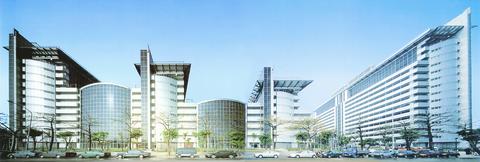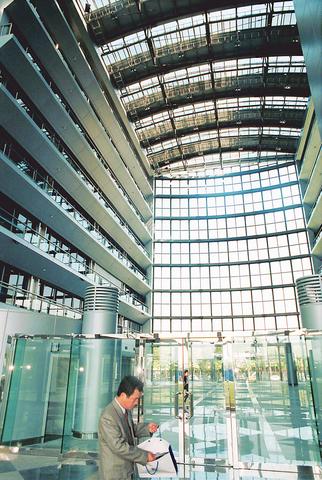After Typhoon Nari rained down on the Nankang Software Park (南港軟體園區) in northwest Taipei last September, shutting power, drowning lower-level facilities and the MRT, the mayor vowed it would never happen again.
At a meeting yesterday in the 58,000-ping park, Taipei City Mayor Ma Ying-jeou (馬英九) and his staff gave a progress report on new measures in place to prevent flooding and touched on other issues, including traffic flow, water shortages and the possibility of direct flights between the city airport and Shanghai.
"Taiwanese companies are doing research here and using China as a production base," Ma said.

PHOTO: NANKANG SOFTWARE PARK
Part of the traffic problem for workers at companies located in Taipei's high-tech parks in Neihu, Nankang, and one planned for Kuandu, is the distance to CKS International Airport and the lack of direct air links with China.
"We have a good city airport [Sungshan Airport], why not use it?" he asked.
The mayor failed to address the obvious major political hurdle to the idea -- a lack of any progress on the issue with Beijing.

PHOTO: GEORGE TSORNG, TAIPEI TIMES
Direct flights from Sungshan Airport to Shanghai would take only 80 minutes, far less time than the 6-to-7 hours currently spent flying to China, Ma said. The Taipei-Hong Kong air route is one of the most traveled in Asia, with over 200 flights per week.
He also said additional bus routes had been added to link the Nankang Software Park with the nearby Neihu Technology Park (內湖科技園區), which was renamed yesterday.
Staff members from Ma's team also allayed fears of a repeat of the flooding and power losses experienced by the park during Typhoon Nari. The typhoon caused massive flooding in Taiwan, shutting down parts of the subway system for months and overrunning power stations.
The 88 companies in the software park were forced to shut down for nearly two weeks, with losses estimated at over NT$200 million (US$6 million). Flood waters breached dikes and overflow walls and water pumps malfunctioned because of a lack of maintenance.
Since that time, city officials have deepened the river channel by dredging out silt, built new flood walls in strategic locations and increased the number of pumps able to clear water from city streets, said Yang Min-chang (楊敏昌), deputy director of the Nankang District.
A series of two-story structures have been built for power trans-formers to insure a steady flow of electricity to the park, he said.
The Nankang Software Park opened in October 1999, and a failure to fill available space prompted officials to invite semiconductor design houses and biotech firms to open offices there as well. A second phase of construction adding 78,000-ping of office space to the park is slated to be completed by the end of next year.

To many, Tatu City on the outskirts of Nairobi looks like a success. The first city entirely built by a private company to be operational in east Africa, with about 25,000 people living and working there, it accounts for about two-thirds of all foreign investment in Kenya. Its low-tax status has attracted more than 100 businesses including Heineken, coffee brand Dormans, and the biggest call-center and cold-chain transport firms in the region. However, to some local politicians, Tatu City has looked more like a target for extortion. A parade of governors have demanded land worth millions of dollars in exchange

Hong Kong authorities ramped up sales of the local dollar as the greenback’s slide threatened the foreign-exchange peg. The Hong Kong Monetary Authority (HKMA) sold a record HK$60.5 billion (US$7.8 billion) of the city’s currency, according to an alert sent on its Bloomberg page yesterday in Asia, after it tested the upper end of its trading band. That added to the HK$56.1 billion of sales versus the greenback since Friday. The rapid intervention signals efforts from the city’s authorities to limit the local currency’s moves within its HK$7.75 to HK$7.85 per US dollar trading band. Heavy sales of the local dollar by

Taiwan Semiconductor Manufacturing Co’s (TSMC, 台積電) revenue jumped 48 percent last month, underscoring how electronics firms scrambled to acquire essential components before global tariffs took effect. The main chipmaker for Apple Inc and Nvidia Corp reported monthly sales of NT$349.6 billion (US$11.6 billion). That compares with the average analysts’ estimate for a 38 percent rise in second-quarter revenue. US President Donald Trump’s trade war is prompting economists to retool GDP forecasts worldwide, casting doubt over the outlook for everything from iPhone demand to computing and datacenter construction. However, TSMC — a barometer for global tech spending given its central role in the

An Indonesian animated movie is smashing regional box office records and could be set for wider success as it prepares to open beyond the Southeast Asian archipelago’s silver screens. Jumbo — a film based on the adventures of main character, Don, a large orphaned Indonesian boy facing bullying at school — last month became the highest-grossing Southeast Asian animated film, raking in more than US$8 million. Released at the end of March to coincide with the Eid holidays after the Islamic fasting month of Ramadan, the movie has hit 8 million ticket sales, the third-highest in Indonesian cinema history, Film